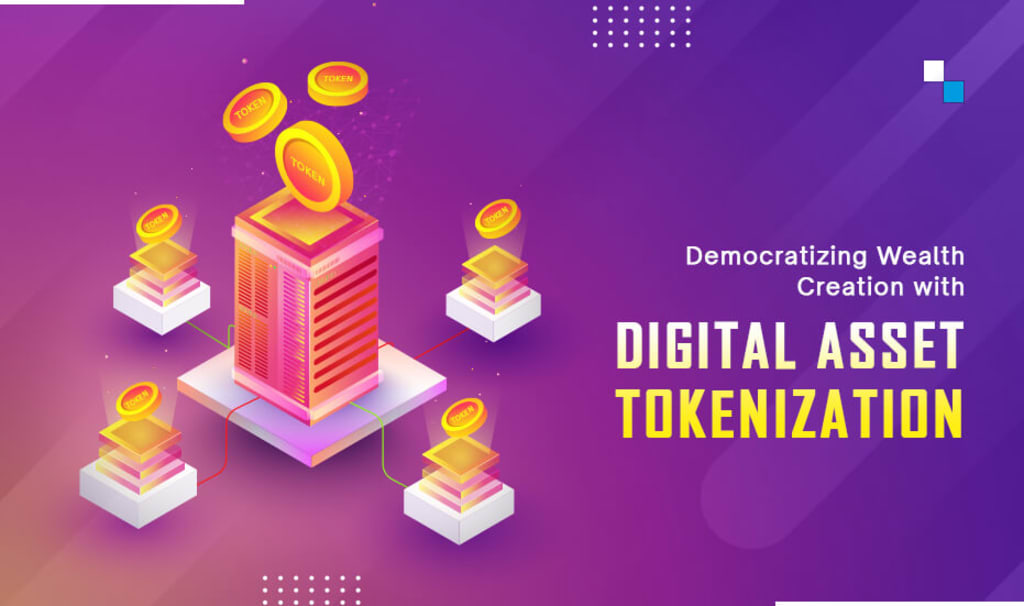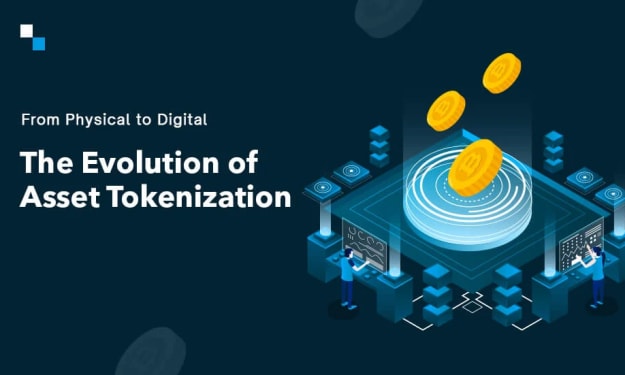Unlock Profit Making Opportunities with Digital Asset Tokenization
Digital Asset Tokenization

In recent years, the concept of digital asset tokenization has been gaining popularity in the world of finance and investment. With the advent of blockchain technology, digital assets can now be represented as tokens on a decentralized ledger, making it easier to buy, sell, and trade these assets.
Overview of Digital Asset Tokenization as a democratizing force in Investments
It is the process of converting real-world assets into digital tokens that can be traded on a blockchain network. This process is made possible through the use of smart contracts, which automate the issuance, transfer, and ownership of tokens.
Investments can be democratized by removing barriers to entry and allowing for fractional ownership of assets. This means that investors of all sizes can participate in investments that were previously only accessible to wealthy individuals or institutions.
Investment Equality: The Power of Accessibility and Inclusion
Here’s how asset tokenization helps the creators and inventors in the crypto world:
1. Breaking down financial barriers
Investing in traditional assets such as real estate, fine art, or private equity often requires a large amount of capital, making it inaccessible to a large number of potential investors. Asset tokenization has emerged as a solution to this problem by breaking down traditional financial barriers and enabling a wider range of investors to participate in the market.
By using digital asset tokenization service, these assets can be divided into smaller fractions, allowing investors to purchase only what they can afford. This not only increases accessibility but also provides diversification opportunities for investors who may not have been able to access these assets before.
2. Increased liquidity
Tokenized assets can be traded on secondary markets with lower transaction costs, which can provide greater opportunities for diversification and allows quicker access to funds and more efficient trading.
Examples of assets that have been successfully tokenized and have seen increased liquidity include:
Real estate: Fractional ownership of real estate through tokenization has become increasingly popular, allowing investors to own a piece of property without having to buy the whole thing.
Art: The tokenization of artwork has also gained traction in recent years, allowing investors to own a piece of art without having to purchase the entire work. This provides greater opportunities for collectors to diversify their portfolios.
Commodities: The tokenization of commodities such as gold, silver, and oil has also been explored, allowing investors to own a fraction of a physical commodity without taking physical delivery.
3. Global reach
Traditional investments are often limited to local or regional markets. However, modern tokenization offers global investment opportunities that allow investors to access assets from anywhere in the world.
Examples of tokenized assets that have attracted international investment include real estate properties in different countries, fine art pieces, and commodities like gold and oil.
4. Transparency and Traceability
All transactions on the blockchain network are transparent and recorded on an immutable ledger. This provides increased traceability and reduces the risk of fraud or manipulation.
5. Reduced Transaction Costs and Faster Settlement Times
Tokenization eliminates the need for intermediaries such as banks, brokers, and regulators, resulting in lower transaction costs and faster settlement times.
Investment Opportunities
Digital asset tokenization provides investment opportunities across a wide range of asset classes.
Stocks and Equities
Tokenized stocks are digital tokens that represent ownership of a company’s stock. One of the key advantages of tokenized stocks is the ability to make buying and selling stocks faster, cheaper, and more transparent.
An example of a successful tokenized stock offering is the issuance of tZERO tokens by the security token platform tZERO. These tokens represent ownership in tZERO’s parent company, Overstock.com. The tokens were issued through an SEC-regulated security token offering (STO) and are tradeable on the tZERO platform. By tokenizing its stock, Overstock was able to raise capital more efficiently and provide investors with increased liquidity and transparency.
Real Estate
Real estate has long been thought to be a safe and appealing investment option, but traditional real estate investments can need substantial sums of cash and can be difficult to liquidate. The digital asset tokenization service makes it feasible to invest in real estate with less cash and more liquidity.
Advantages of tokenized real estate:
Tokenization can make real estate investment more accessible, enable fractional ownership, and increase liquidity. It can also make real estate investment more efficient and transparent by using blockchain technology to streamline processes and eliminate intermediaries.
Example of a successful tokenized real estate offering:
“The St. Regis Aspen Resort in Colorado, which was tokenized on the blockchain platform Indiegogo in 2018, is one example of a successful tokenized real estate deal. With a minimum investment of $21,000, buyers may obtain fractional ownership in the upscale resort. The tokenized ownership structure enabled investors to exchange their tokens on secondary marketplaces, increasing liquidity.”
The property owner benefited from the tokenization of the St. Regis Aspen Resort as well, since it allowed them to obtain funds fast and effectively without having to sell the entire property. It also allowed them to access a broader audience of investors, including individuals who would not have been able to invest in traditional real estate transactions.
Artwork and Collectibles
The tokenization of artwork and collectibles is a new and exciting development in the world of investment.
Advantages of tokenized artwork and collectibles:
In contrast to traditional art and collectibles investments, which are generally confined to affluent individuals, tokenization allows investors to own a piece of valuable goods with a little investment. It also allows for speedier and more efficient trade, as well as transparency in ownership, which is especially significant in the field of art, where provenance and authenticity are critical.
Example of a successful tokenized artwork offering:
A successful tokenized artwork offering is the sale of “The Burned Banksy.” A group of investors bought the original Banksy artwork in 2021, which had been destroyed and then revived as a non-fungible token (NFT). The investors were able to purchase a piece of the artwork, represented by the NFT, for more than $400,000. This effective tokenization of artwork not only made it more accessible to small investors, but it also enabled faster and more efficient trading by allowing it to be purchased and sold on a blockchain-based platform.
The Future of Digital Asset Tokenization
Asset tokenization is currently in vogue in the technological arena, and its popularity is going to grow in the days to come. Let’s understand what more we are expecting in the future:
1. Regulatory concerns
The growth of digital asset tokenization has raised regulatory concerns that need to be addressed. Some regulators worry about the lack of transparency and the potential risks to investors, such as fraud, market manipulation, and cybersecurity threats. They also worry that tokenization may undermine investor protection, capital formation, and financial stability. These concerns can be somehow mitigated after incorporating the following steps:
Engage with regulators early and often: It’s important to establish open lines of communication with regulators, seeks their feedback, and keep them informed of your plans.
Ensure compliance with existing regulations: Ensure that your tokenization process complies with existing regulations, including securities laws and anti-money laundering regulations.
Consider regulatory frameworks: Ensure that you comply with requirements and regulations in other jurisdictions where you plan to operate.
Use smart contract technology to ensure compliance: Smart contracts can help with holding periods or adding limitations on the number of investors.
Engage with industrial & self-regulatory organizations: They can help establish best practices and guidelines for tokenization and build trust with investors and regulators alike.
Consider the use of regulatory sandboxes: Consider applying to a regulatory sandbox to test your tokenization process and identify any regulatory concerns before launching on a larger scale.
2. Integration with traditional investments
To offer investors diverse portfolios comprising traditional and tokenized assets, tokenization may be combined with traditional investment vehicles such as mutual funds and exchange-traded funds (ETFs). These investment vehicles can provide more transparency, liquidity, and accessibility to a broader range of assets with a trustworthy digital asset tokenization service.
For example, a mutual fund may invest in a mix of traditional stocks and bonds, as well as tokenized real estate and art. Similarly, an ETF may include a mix of traditional equities and tokenized commodities.
Several companies and platforms are already working on integrating tokenized assets with traditional investment vehicles. For instance, the investment management firm Franklin Templeton has launched a tokenized money market fund, and the investment firm Grayscale offers several tokenized trusts that invest in cryptocurrencies and digital assets. In addition, the investment platform Coinbase has recently launched an index fund that includes a mix of traditional and digital assets.
3. Expansion to new asset classes
Asset tokenization has the potential to expand to new asset classes beyond the traditional ones like stocks, real estate, and collectibles. In fact, almost any asset that can be represented digitally could be tokenized.
One potential new asset class that could be tokenized is commodities, such as precious metals, oil, or agricultural products.
Another potential asset class that could be tokenized is intellectual property, such as patents or copyrights.
Furthermore, sports teams are also a potential asset class that could be tokenized. Fans could own a fraction of their favorite team, allowing them to share in the team’s success and potentially even have a say in certain team decisions.
There are also many other potential asset classes that could be tokenized, such as venture capital funds, fine wines, or carbon credits. As technology continues to evolve, it’s likely that more and more asset classes will become available for tokenization.
Summing-Up
The tokenization of digital assets has emerged as a major driver in democratizing access to investing possibilities. By removing conventional financial obstacles, improving liquidity, allowing small investors to participate, and offering global investment opportunities.
This has the potential to have a substantial influence on the investing landscape. The investing environment will grow more diversified as more traditional assets are tokenized.
If you want to unlock new opportunities to participate in previously inaccessible markets. create entirely new markets that were previously unimaginable, Antier provides a reliable solution for you to explore the transformative potential of digital asset tokenization.
Original Source: https://www.antiersolutions.com/unlock-profit-making-opportunities-with-digital-asset-tokenization/
About the Creator
Asset Tokenization services
Antier's asset tokenization services allow you to convert your traditional assets into digital tokens, which can then be traded on blockchain-based platforms.






Comments
There are no comments for this story
Be the first to respond and start the conversation.